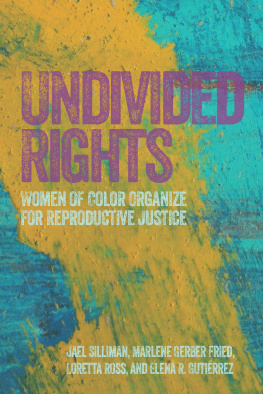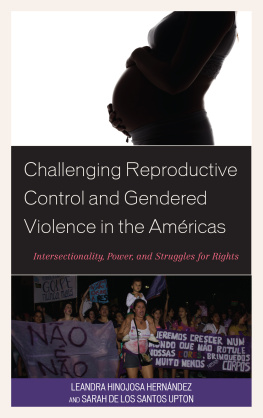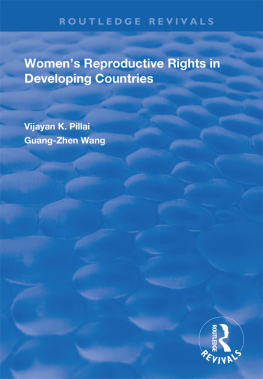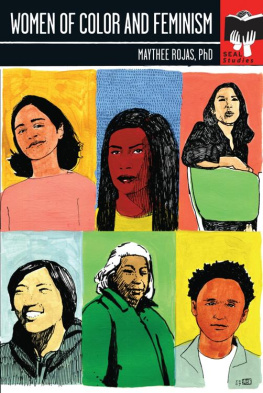2004 by Jael Silliman, Marlene Gerber Fried, Loretta Ross, and Elena R. Gutirrez
First published by South End Press in Cambridge, Massachusetts.
This edition published in 2016 by
Haymarket Books
P.O. Box 180165
Chicago, IL 60618
773-583-7884
www.haymarketbooks.org
info@haymarketbooks.org
ISBN: 978-1-60846-664-1
Trade distribution:
In the US, Consortium Book Sales and Distribution, www.cbsd.com
In Canada, Publishers Group Canada, www.pgcbooks.ca
In the UK, Turnaround Publisher Services, www.turnaround-uk.com
All other countries, Publishers Group Worldwide, www.pgw.com
This book was published with the generous support of Lannan Foundation and Wallace Action Fund.
Printed in Canada by union labor.
Library of Congress Cataloging-in-Publication data is available.
10 9 8 7 6 5 4 3 2 1
Preface to the 2004 Edition and Acknowledgments
W e are not dispassionate observers of our subjectfrom the outset this book was conceived of as a political project. We set out to lift up the voices and the achievements of women of color who are transforming the struggle for sexual and reproductive health and rights into a movement for reproductive justice. We culled vital lessons from their experiences of working to develop a more holistic and inclusive movement vision and suggestions on ways to better work together across differences.
Each one of us has been engaged with and committed to the work women of color have been doing to realize reproductive rights. Our activism has shaped the writing and analysis we developed in this book. As a multiracial team of women, we valued our very different movement histories as well as our varied frames of reference. Co-authorship meant debating and critiquing each others writing and analysis and rethinking some of our own assumptions and perspectives. It required each of us to learn histories with which we were less familiar. As co-authors we deeply engaged with one anothers analysis, bringing several lenses at once to understand the complex terrain in which women of color operate. Writing this together has been a profound learning and bonding experience.
Since how we understand the world and seek to shape it is determined by our pasts and visions of the future, we briefly sketch where each of us has worked over the years.
Jael Silliman has been an activist both in the US and international womens health and reproductive rights movements. She was a program officer at the Jessie Smith Noyes Foundation, an early supporter of organizations of women of color. She was an associate professor of womens studies at the University of Iowa, where she wrote about social movements, womens health, and reproductive rights. She is currently the program officer for reproductive rights in the Human Rights Unit at the Ford Foundation. Her most recent book is Policing the National Body: Race, Gender, and Criminalization , co-edited with Anannya Bhattacharjee. She is from India and is an immigrant to the US.
Marlene Gerber Fried came to reproductive rights after her involvement in the civil rights, womens liberation, and anti-war movements of the 1960s. Since the late 1970s, her focus has been domestic and international abortion and reproductive rights. She works with student activists in her role as director of the Civil Liberties and Public Policy Program at Hampshire College, where she is also a professor of philosophy. Marlene is the founding president of the National Network of Abortion Funds, a co-founder and board member of the Abortion Access Project, and serves on the international board of the Womens Global Network for Reproductive Rights. She edited From Abortion to Reproductive Freedom: Transforming a Movement .
Loretta Ross has a 25-year history in the womens movement, both in ending violence against women and promoting reproductive rights in the United States and internationally. She was active in the black Nationalist and civil rights movements. She has written extensively on African American women and abortion, and organized two national conferences on reproductive rights for women of color in 1987 and 2003, respectively. Loretta is a co-founder of the SisterSong Women of Color Reproductive Health Collective, the founder and executive director of the National Center for Human Rights Education, and is on the board of SisterLove, a womens HIV/AIDS organization. Most recently, she was national co-director of the March for Womens Lives, April 2004, Washington, DC.
Elena Gutirrez has researched issues in Latina reproductive health for 15 years. She is currently an assistant professor of gender and womens studies and Latin American and Latino studies at the University of Illinois at Chicago. She is completing another book, Fertile Matters: The Politics of Mexican-Origin Womens Reproduction , which is forthcoming from the University of Texas Press. She has worked closely with several womens health organizations and is the past board president of ACCESS/Womens Health Rights Collective.
While we are ultimately responsible for what we have written, this ambitious project could not have been undertaken without the support and inspiration of the many people who commit each day of their lives to advance womens human rights. We thank the leaders, boards, and staff of each of the organizations featured. They spent time with us in interviews; shared their organizational resources, reports, and files; suggested people with whom we should speak to develop a more comprehensive understanding of their work; and reviewed and commented on drafts, working with us to get the organizational histories and details right. It has been our privilege to document their activities. We hope that through this book the essential work that they are doing in their communities will be better known and appreciated. Our scholarship on the activism of women of color in the reproductive health movement is just a beginning. The people we have interviewed, the organizations we feature, and the many others we could not include deserve further research and documentation as they are pioneers in this broad and vibrant movement.
We thank the Open Society Institute, who selected our proposal under the Individual Fellows Program and also gave us a publishing support grant. This financial support enabled us to conduct the research and writing for this book and allowed South End Press to expand its outreach and publicity. We thank the womens studies department of the University of Iowa, the Civil Liberties and Public Policy Program at Hampshire College, the National Center for Human Rights Education, and the gender and womens studies and Latin American and Latino studies departments at the University of Illinois at Chicago for the institutional support they provided to carry this work forward.
In these harsh political times, we especially appreciated working with South End Press and its commitment to radical social change. We thank Loie Hayes and Jill Petty for their dedication to our book. We deeply value the many contributions of our main editor, Joey Fox, who believed in the books importance. She worked with us through several drafts, always with great patience, thoughtfulness, and sensitivity. We also thank, in association with South End Press, Elizabeth Terzakis, Jess Lin, and Chris Hu for their relentless attention to detail.
We are indebted to Susan Harris for her early edits and Stephanie Poggi for her detailed read of a previous draft; both were critical in sharpening our thinking and focus. Jill Moffett of the University of Iowa assisted us through many stages of the writing and editing process and helped us with footnotes and bibliographies several times over. Others who assisted us in research, citation, and formatting include Katharina Mendoza, Karin Krslovic, Shell Feijo, Lauren Rice, Fiona Young, Cynthia Estep, Erin Howe, M. J. Maccardini, Liz Brown, Ariella Rotramel, Elizabeth Garcia, and Marisol Salgado.
Next page







